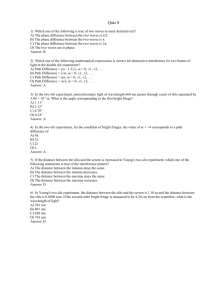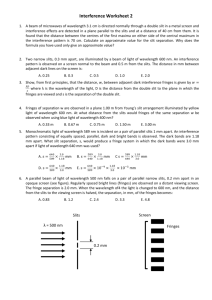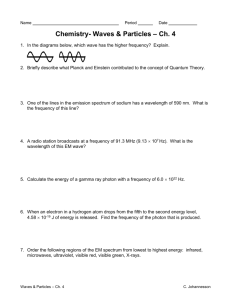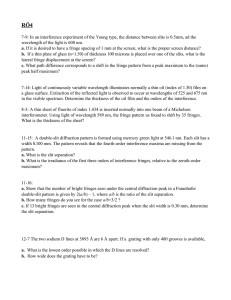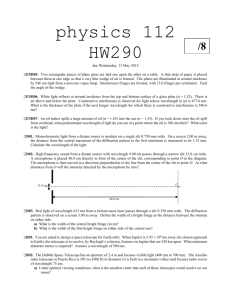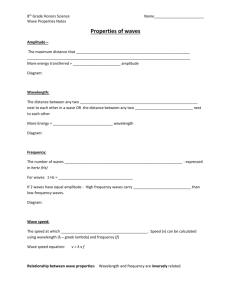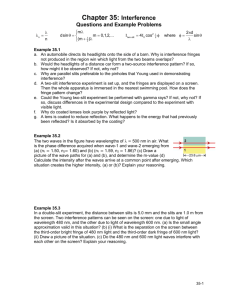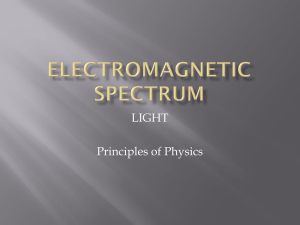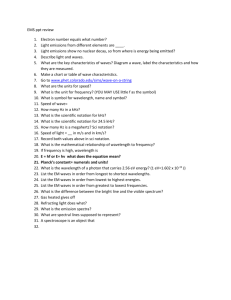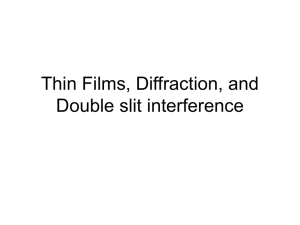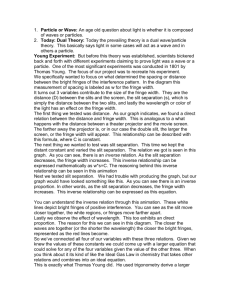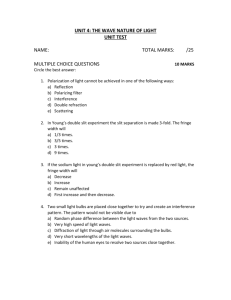Test-wave-optics - PRADEEP KSHETRAPAL PHYSICS
advertisement
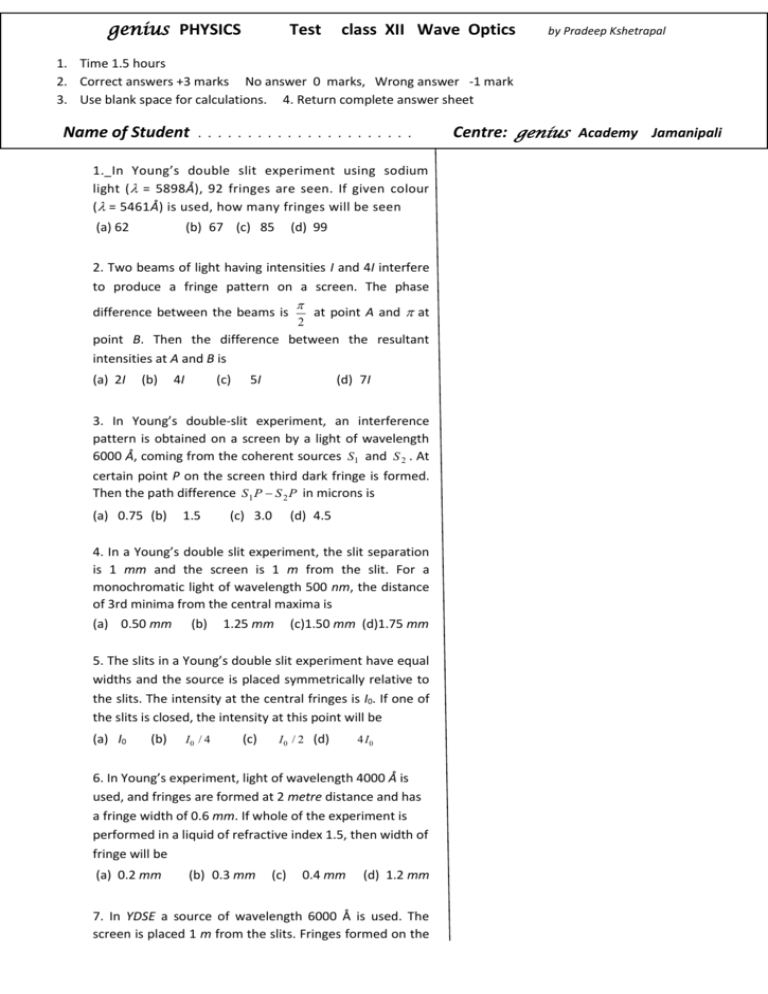
genius PHYSICS Test class XII Wave Optics by Pradeep Kshetrapal 1. Time 1.5 hours 2. Correct answers +3 marks No answer 0 marks, Wrong answer -1 mark 3. Use blank space for calculations. 4. Return complete answer sheet Name of Student . . . . . . . . . . . . . . . . . . . . . . 1._In Young’s double slit experiment using sodium light ( = 5898Å), 92 fringes are seen. If given colour ( = 5461Å) is used, how many fringes will be seen (a) 62 (b) 67 (c) 85 (d) 99 2. Two beams of light having intensities I and 4I interfere to produce a fringe pattern on a screen. The phase difference between the beams is at point A and at 2 point B. Then the difference between the resultant intensities at A and B is (a) 2I (b) 4I (c) 5I (d) 7I 3. In Young’s double-slit experiment, an interference pattern is obtained on a screen by a light of wavelength 6000 Å, coming from the coherent sources S1 and S 2 . At certain point P on the screen third dark fringe is formed. Then the path difference S 1 P S 2 P in microns is (a) 0.75 (b) 1.5 (c) 3.0 (d) 4.5 4. In a Young’s double slit experiment, the slit separation is 1 mm and the screen is 1 m from the slit. For a monochromatic light of wavelength 500 nm, the distance of 3rd minima from the central maxima is (a) 0.50 mm (b) 1.25 mm (c)1.50 mm (d)1.75 mm 5. The slits in a Young’s double slit experiment have equal widths and the source is placed symmetrically relative to the slits. The intensity at the central fringes is I0. If one of the slits is closed, the intensity at this point will be (a) I0 (b) I0 / 4 (c) I0 / 2 (d) 4 I0 6. In Young’s experiment, light of wavelength 4000 Å is used, and fringes are formed at 2 metre distance and has a fringe width of 0.6 mm. If whole of the experiment is performed in a liquid of refractive index 1.5, then width of fringe will be (a) 0.2 mm (b) 0.3 mm (c) 0.4 mm (d) 1.2 mm 7. In YDSE a source of wavelength 6000 Å is used. The screen is placed 1 m from the slits. Fringes formed on the Centre: genius Academy Jamanipali screen, are observed by a student sitting close to the slits. The student's eye can distinguish two neighbouring fringes. If they subtend an angle more than 1 minute of arc. What will be the maximum distance between the slits so that the fringes are clearly visible (b) 2.06 cm (c) 2.06 10–3 mm (d) None (a) 2.06 mm 8. The width of one of the two slits in a Young's double slit experiment is double of the other slit. Assuming that the amplitude of the light coming from a slit is proportional to the slit width. The ratio of the maximum to the minimum intensity in interference pattern will be (a) 1 a 9 1 (b) (c) 2 1 1 2 (d) 9. A star is moving towards the earth with a speed of 4.5 10 6 m / s . If the true wavelength of a certain line in the spectrum received from the star is 5890 Å, its apparent wavelength will be about [c 3 10 8 m / s] (a) 5890 Å (b) 5978 Å (c) 5802 Å (d) 5896 Å 10. When light passes from one medium into another medium, then the physical property which does not change is (a) Velocity (b) Wavelength (c) Frequency (d) Refractive index 11. What is the path difference of destructive interference (a) n (b) n( + 1) (c) (n 1) 2 (d) (2n 1) 2 12. Wave nature of light is verified by (a) (c) Interference Reflection (b) Photoelectric effect (d) Refraction 13. In a wave, the path difference corresponding to a phase difference of is (a) 2 (b) (c) 2 (d) 14. Waves that can not be polarised are (a)Transverse waves (b) Longitudinal waves (c)Light waves (d) Electromagnetic Waves 15. The phenomena of interference is shown by (a) Longitudinal mechanical waves only (b) Transverse mechanical waves only (c) Electromagnetic waves only (d) All the above types of waves 16. If the distance between a point source and screen is doubled, then intensity of light on the screen will become (a) Four times (b) Double (c) Half (d) One-fourth 17. Which one of the following statements is correct (a) In vacuum, the speed of light depends upon frequency (b) In vacuum, the speed of light does not depend upon frequency (c) In vacuum, the speed of light is independent of frequency and wavelength (d) In vacuum, the speed of light depends upon wavelength 18. Diffraction effects are easier to notice in the case of sound waves than in the case of light waves because (a) Sound waves are longitudinal (b) Sound is perceived by the ear (c) Sound waves are mechanical waves (d) Sound waves are of longer wavelength 19. In the far field diffraction pattern of a single slit under polychromatic illumination, the first minimum with the wavelength 1 is found to be coincident with the third maximum at 2 . So (a) 31 0.32 (b) 31 2 (c) 1 3.52 (d) 0.31 32 20. Plane polarised light is passed through a polaroid. On viewing through the polaroid we find that when the polariod is given one complete rotation about the direction of the light, one of the following is observed (a) The intensity of light gradually decreases to zero and remains at zero (b) The intensity of light gradually increases to a maximum and remains at maximum (c) There is no change in intensity (d) The intensity of light is twice maximum and twice zero MARK YOUR ANSWERS HERE Q. No. a b c d 1 O O O O 2 O O O O 3 O O O O 4 O O O O 5 O O O O 6 O O O O 7 O O O O 8 O O O O 9 O O O O 10 O O O O 11 O O O O 12 O O O O 13 O O O O 14 O O O O 15 O O O O 16 O O O O 17 O O O O 18 O O O O 19 O O O O 20 O O O O Total +3 -1
